上外综合教程4 Unit 14电子教案
- 格式:doc
- 大小:218.00 KB
- 文档页数:23
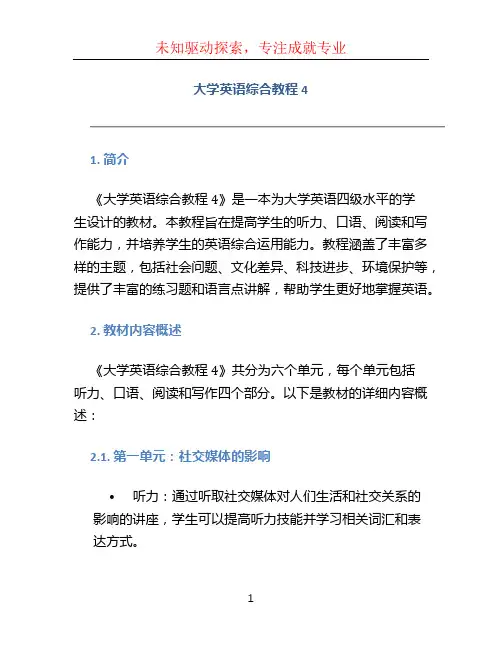
大学英语综合教程41. 简介《大学英语综合教程4》是一本为大学英语四级水平的学生设计的教材。
本教程旨在提高学生的听力、口语、阅读和写作能力,并培养学生的英语综合运用能力。
教程涵盖了丰富多样的主题,包括社会问题、文化差异、科技进步、环境保护等,提供了丰富的练习题和语言点讲解,帮助学生更好地掌握英语。
2. 教材内容概述《大学英语综合教程4》共分为六个单元,每个单元包括听力、口语、阅读和写作四个部分。
以下是教材的详细内容概述:2.1. 第一单元:社交媒体的影响•听力:通过听取社交媒体对人们生活和社交关系的影响的讲座,学生可以提高听力技能并学习相关词汇和表达方式。
•口语:学生将参与小组讨论,就社交媒体对人与人相互作用的影响发表自己的观点。
•阅读:学生将阅读社交媒体使用的优缺点,并回答相关问题以促进理解和思考。
•写作:学生将撰写一篇关于社交媒体及其影响的文章。
2.2. 第二单元:大城市的生活方式•听力:学生将听取一篇介绍大城市生活方式的录音稿,并回答相关问题以提高听力技能。
•口语:学生将练习描述大城市生活的对话,并参与角色扮演以提高口语表达能力。
•阅读:通过阅读一篇相关文章,学生可以了解大城市生活的优点和缺点,并回答相关问题提高阅读理解能力。
•写作:学生将就大城市生活的利与弊撰写一篇短文。
2.3. 第三单元:环境保护•听力:学生将听取一篇关于环境保护的讲座,并回答相关问题以提高听力技能。
•口语:学生将讨论环境保护的重要性,并进行相关角色扮演。
•阅读:学生将阅读一篇介绍环境问题的文章,并回答相关问题。
•写作:学生将从个人角度出发,撰写一篇描述环境保护重要性的文章。
2.4. 第四单元:文化差异•听力:学生将听取一篇介绍文化差异的讲座,并回答相关问题以提高听力技能。
•口语:学生将组成小组讨论不同文化之间的差异,并发表自己的观点。
•阅读:学生将阅读一篇关于跨文化交流的文章,并回答相关问题。
•写作:学生将撰写一篇关于自己体验文化差异的文章。
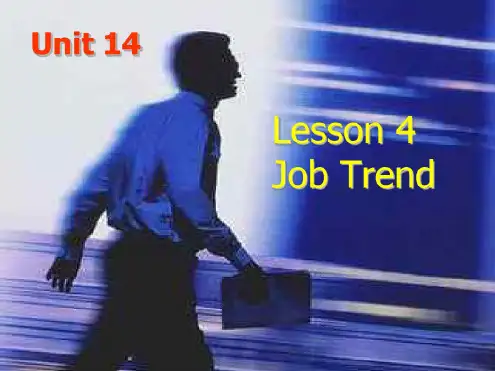
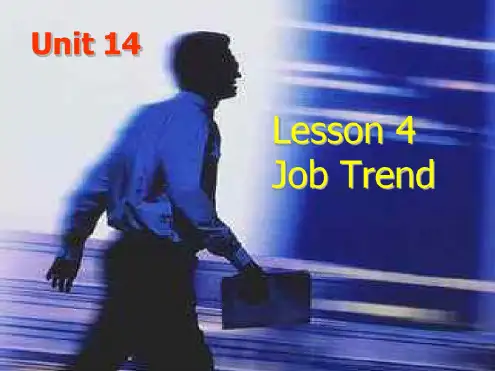
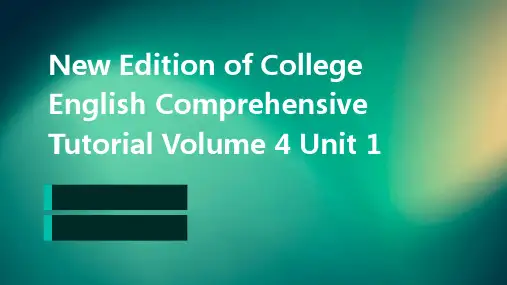
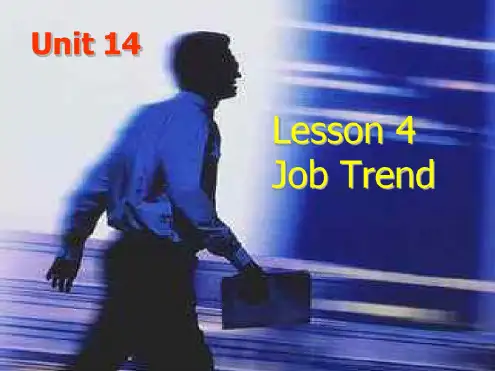
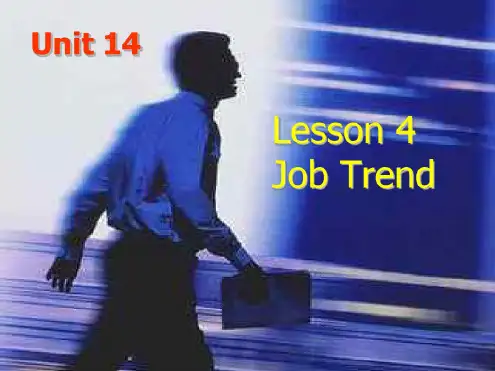
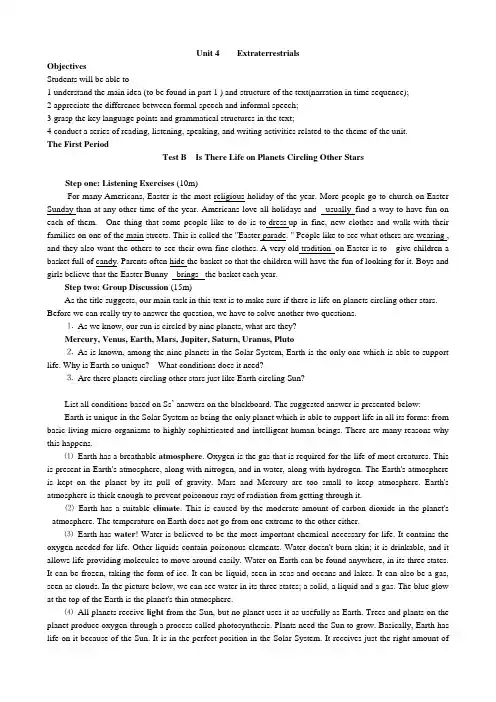
Unit 4 ExtraterrestrialsObjectivesStudents will be able to1 understand the main idea (to be found in part 1 ) and structure of the text(narration in time sequence);2 appreciate the difference between formal speech and informal speech;3 grasp the key language points and grammatical structures in the text;4 conduct a series of reading, listening, speaking, and writing activities related to the theme of the unit.The First PeriodTest B Is There Life on Planets Circling Other StarsStep one: Listening Exercises (10m)For many Americans, Easter is the most religious holiday of the year. More people go to church on Easter Sunday than at any other time of the year. Americans love all holidays and usually find a way to have fun on each of them. One thing that some people like to do is to dress up in fine, new clothes and walk with their families on one of the main streets. This is called the "Easter parade. " People like to see what others are wearing , and they also want the others to see their own fine clothes. A very old tradition on Easter is to give children a basket full of candy. Parents often hide the basket so that the children will have the fun of looking for it. Boys and girls believe that the Easter Bunny brings the basket each year.Step two: Group Discussion (15m)As the title suggests, our main task in this text is to make sure if there is life on planets circling other stars. Before we can really try to answer the question, we have to solve another two questions.⒈As we know, our sun is circled by nine planets, what are they?Mercury, Venus, Earth, Mars, Jupiter, Saturn, Uranus, Pluto⒉As is known, among the nine planets in the Solar System, Earth is the only one which is able to support life. Why is Earth so unique? What conditions does it need?⒊Are there planets circling other stars just like Earth circling Sun?List all conditions based on Ss’ answers on the blackboard. The suggested answer is presented below:Earth is unique in the Solar System as being the only planet which is able to support life in all its forms: from basic living micro-organisms to highly sophisticated and intelligent human beings. There are many reasons why this happens.⑴Earth has a breathable atmosphere. Oxygen is the gas that is required for the life of most creatures. This is present in Earth's atmosphere, along with nitrogen, and in water, along with hydrogen. The Earth's atmosphere is kept on the planet by its pull of gravity. Mars and Mercury are too small to keep atmosphere. Earth's atmosphere is thick enough to prevent poisonous rays of radiation from getting through it.⑵Earth has a suitable climate. This is caused by the moderate amount of carbon dioxide in the planet's atmosphere. The temperature on Earth does not go from one extreme to the other either.⑶Earth has water! Water is believed to be the most important chemical necessary for life. It contains the oxygen needed for life. Other liquids contain poisonous elements. Water doesn't burn skin; it is drinkable, and it allows life-providing molecules to move around easily. Water on Earth can be found anywhere, in its three states. It can be frozen, taking the form of ice. It can be liquid, seen in seas and oceans and lakes. It can also be a gas, seen as clouds. In the picture below, we can see water in its three states; a solid, a liquid and a gas. The blue glow at the top of the Earth is the planet's thin atmosphere.⑷All planets receive light from the Sun, but no planet uses it as usefully as Earth. Trees and plants on the planet produce oxygen through a process called photosynthesis. Plants need the Sun to grow. Basically, Earth has life on it because of the Sun. It is in the perfect position in the Solar System. It receives just the right amount ofheat from the Sun, and enough light for plants to photosynthesis. This process of photosynthesis puts oxygen into the atmosphere. Humans need oxygen to breathe and to live.Step three: Text Analysis (65m)Then get down to business and analyze this text. Ts make Ss scan Text B in 5 minutes to divide the passage and then let them generalize the main idea of each part. In general, the whole text falls into 4 parts as it is shown in the table:⒊Are there planets circling other stars just like Earth circling Sun? (Para2-6)⑴In theory, the possibility exists.Nine planets are formed and circling Sun which was supposed to be formed from a cloud of dust and gas, which should apply to other stars.⑵In fact, on one hand, we haven’t seen any planets circling other stars even with the sophisticated instruments. Planets don’t shine themselves until the light from stars is reflected, but the long distance with the nearest star except our solar system makes it impossible to deliver enough light to be seen.On the other hand, Bessel has made some discoveries that Sirius A was observed to move in a wavy line, from that observation, he got a conclusion that a gravitational pull from another heavenly body exists and affects Sirius A. probably , that heavenly body is a planet. But the effect is desperately small and difficult to be detected, nothing is better than to choose a star.a.that is very close to us so that we can measure any deviation from its path most accurately.b.that should be small so that a planet could affect its notion sufficiently.c.the planet itself would have to be very large so that it can produce a sizable effect.⑶Possibility:Some bright stars have been found to be surrounded by bands of dust which might be asteroid belts. And where asteroids exist, larger planets ought to exist too.The Second PeriodStep one: ( continue to analyze the rest structure of) Text B (60m)⒋Now let us come to the most important question produced in the title: Suppose there are planets circling most stars, what does that tell us about the possibility of life on those planets? (Para7-13) (Ts provide the clues and guide Ss to look for the corresponding information to complete the sentences)If the planet supports life, it is required to have some conditions:⑴ a reasonably stable orbit---neither too far nor too closeIf the planets are too close to the stars, the tidal effects would draw them face only one side to the stars and the other side against them, so that the half one is too hot and the other is too cold. It is clear that being extremely hot or cold is harmful to life. However, the planets are too far from the stars, then they couldn’t get enough light tosupport life on them.⑵the right size---massive but not so muchA planet would be massive enough to hold on to the atmosphere and ocean, but not so massive that it would collect hydrogen and helium. E.g. Mercury is the smallest one among the nine and the atmosphere is so thin that it is thought the atmosphere doesn’t exist, conversely, Jupiter is the largest one among the nine, and the gravitation is as massive as to collects gases. It is composed of 90% hydrogen and 10% helium.⑶the proper chemical composition---oxygen without the collection of hydrogen and helium⑷the moderate temperature in the range of liquid waterThe temperate would changes in the range of boiling point and freezing point of water.⑸the proper size of the starsa.If stars are massive, it is likely to explode and destroy themselves. During the short course of life, organismsas advanced as primitive shellfish couldn’t evolve to exist.b.If stars are small and dim, a planet must be very close to get enough light and heat to support life. But at thatclose distance, tidal effects would cause the planet to face only one side to the sun, so that half the planet would be too hot and half too cold.(6) The stars can’t be part of close binaries where too much radiation is hostile to life.If the planet is one of the binaries or too many stars, too much strong radiation from the surrounding stars is harmful to living creatures and hostile to our kind of life, and even destroys the planet some day.⒌We have managed to solve the question in theory, in fact and from all perspectives of the possibility, and as long as we are alert, we will notice that another question come into sight.If life exists on other planets, is it capable of developing a technology like ours? (Para14-19)No matter how slim the chance is, as long as the planet has a stable orbit and existed long enough, the possibility of the forming of organism will appear. But how long would the technology or civilization endure? It is hard to answer. Now we will discuss as follows:Naturally, some question steps onto to the stage and make us confused.Where is the alien life and why does it not come to visit us?①The long distance makes it impossible to cross.②The alien life reaches our earth and keeps us in peace.③For some unclear reasons, the alien life failed to appear.All in all, we can’t state whether there is alien life or not until science proves it.Step two: writing styles (30m)characteristic of scientific English (ask Ss to look for some words and phrases to illustrate)Long words:gravitational pull deviation investigate irregularities massive sequence intelligence dispose ofAccuracy of diction: the use of adv.Probably likely automatically actually extremely accurately certainly mere reasonably simply be massive enough…but not so massive neither too far…not to closeThe use of long and complex sentences (take paras9, 10 and 17, for example)If it had an erratic orbit, there might be ties when its temperature would rise above the boiling point ofwater or, at other ties, drop below Antarctic temperatures, and there would not be much chance of finding life as we know it.(para9)But even assuming that a planet is the right size and has the proper chemical composition and a stable orbit neither too far from its star not too close, so tha t its temperature is at all times in the range of liquid water(as is true of Earth except for the polar regions), a great deal would still depend on the kind of star (which/that) it was revolving about.(para10)(潮汐作用:法国国家科研中心和巴黎居里大学的天文学家最近发现,一颗太阳系以外的行星被氢气层所围绕,该氢气层不仅温度高、而且范围很广,也就是说该行星处于“蒸发”状态。
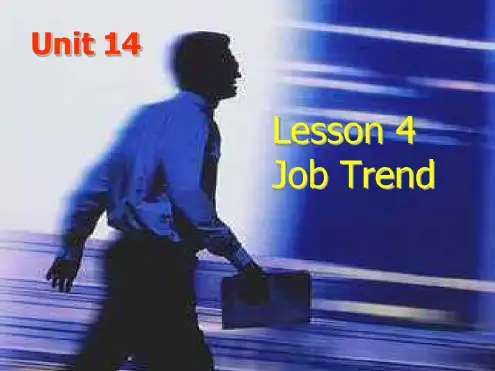
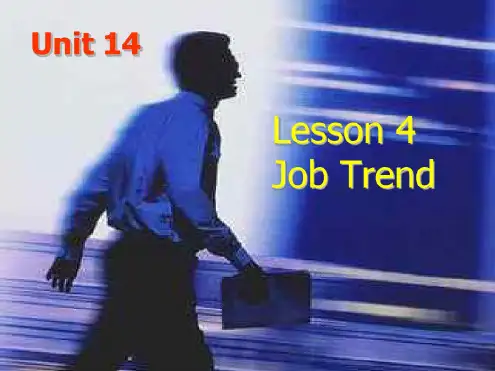
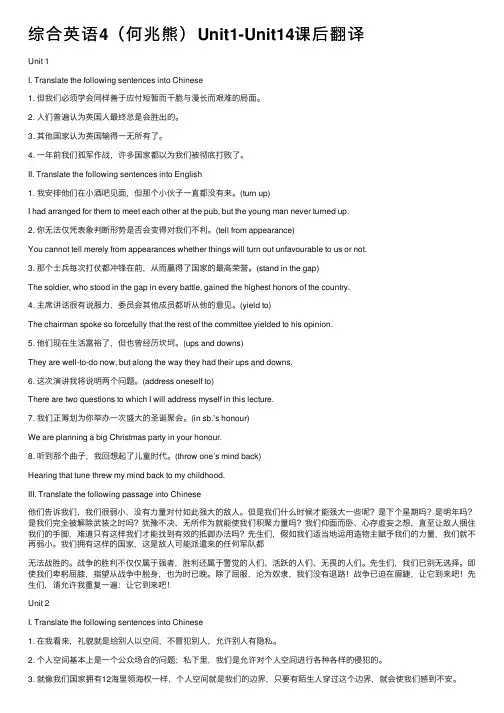
综合英语4(何兆熊)Unit1-Unit14课后翻译Unit 1I. Translate the following sentences into Chinese1. 但我们必须学会同样善于应付短暂⽽⼲脆与漫长⽽艰难的局⾯。
2. ⼈们普遍认为英国⼈最终总是会胜出的。
3. 其他国家认为英国输得⼀⽆所有了。
4. ⼀年前我们孤军作战,许多国家都以为我们被彻底打败了。
II. Translate the following sentences into English1. 我安排他们在⼩酒吧见⾯,但那个⼩伙⼦⼀直都没有来。
(turn up)I had arranged for them to meet each other at the pub, but the young man never turned up.2. 你⽆法仅凭表象判断形势是否会变得对我们不利。
(tell from appearance)You cannot tell merely from appearances whether things will turn out unfavourable to us or not.3. 那个⼠兵每次打仗都冲锋在前,从⽽赢得了国家的最⾼荣誉。
(stand in the gap)The soldier, who stood in the gap in every battle, gained the highest honors of the country.4. 主席讲话很有说服⼒,委员会其他成员都听从他的意见。
(yield to)The chairman spoke so forcefully that the rest of the committee yielded to his opinion.5. 他们现在⽣活富裕了,但也曾经历坎坷。
(ups and downs)They are well-to-do now, but along the way they had their ups and downs.6. 这次演讲我将说明两个问题。
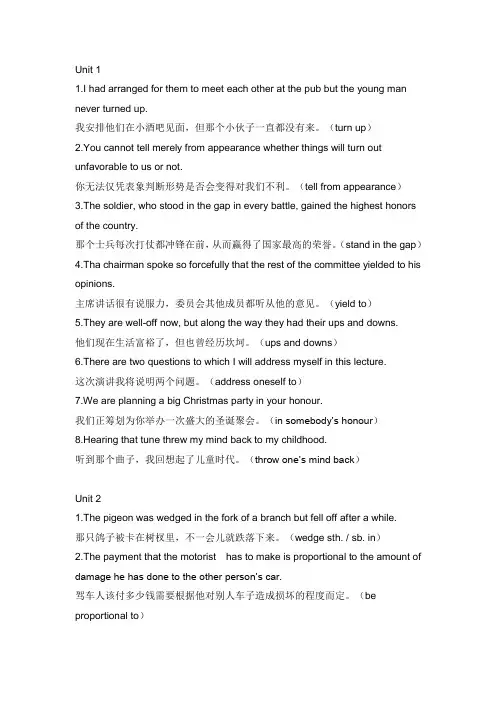
Unit 11.I had arranged for them to meet each other at the pub but the young man never turned up.我安排他们在小酒吧见面,但那个小伙子一直都没有来。
(turn up)2.You cannot tell merely from appearance whether things will turn out unfavorable to us or not.你无法仅凭表象判断形势是否会变得对我们不利。
(tell from appearance)3.The soldier, who stood in the gap in every battle, gained the highest honors of the country.那个士兵每次打仗都冲锋在前,从而赢得了国家最高的荣誉。
(stand in the gap)4.Tha chairman spoke so forcefully that the rest of the committee yielded to his opinions.主席讲话很有说服力,委员会其他成员都听从他的意见。
(yield to)5.They are well-off now, but along the way they had their ups and downs.他们现在生活富裕了,但也曾经历坎坷。
(ups and downs)6.There are two questions to which I will address myself in this lecture.这次演讲我将说明两个问题。
(address oneself to)7.We are planning a big Christmas party in your honour.我们正筹划为你举办一次盛大的圣诞聚会。
Unit 1I. Trans late the follow ing sentences i nto Chinese1.但我们必须学会同样善于应付短暂而干脆与漫长而艰难的局面。
2. 人们普遍认为英国人最终总是会胜出的。
3. 其他国家认为英国输得一无所有了。
4. 一年前我们孤军作战,许多国家都以为我们被彻底打败了。
II. T ranslatethe following s entences into E nglish1. 我安排他们在小酒吧见面,但那个小伙子一直都没有来。
(turn up)I had arrange d for them to m eet each otherat the pub, but the young mannever turned up.2. 你无法仅凭表象判断形势是否会变得对我们不利。
(t ell from appear ance)You cann ot tell merelyfrom appearance s whether thing s will turn out unfavourable t o us or not. 3. 那个士兵每次打仗都冲锋在前,从而赢得了国家的最高荣誉。
(stand in the ga p)The soldier, who stood inthe gap in ever y battle, gaine d the highest h onors of the co untry.4. 主席讲话很有说服力,委员会其他成员都听从他的意见。
(yield to)The chairman spoke so force fully that therest of the com mittee yieldedto his opinion.5. 他们现在生活富裕了,但也曾经历坎坷。
Unit 1I. Translate the following sentences into Chinese1. 但我们必须学会同样善于应付短暂而干脆与漫长而艰难的局面。
2. 人们普遍认为英国人最终总是会胜出的。
3. 其他国家认为英国输得一无所有了。
4. 一年前我们孤军作战,许多国家都以为我们被彻底打败了。
II. Translate the following sentences into English1. 我安排他们在小酒吧见面,但那个小伙子一直都没有来。
(turn up)I had arranged for them to meet each other at the pub, but the young man never turned up.2. 你无法仅凭表象判断形势是否会变得对我们不利。
(tell from appearance)You cannot tell merely from appearances whether things will turn out unfavourable to us or not.3. 那个士兵每次打仗都冲锋在前,从而赢得了国家的最高荣誉。
(stand in the gap)The soldier, who stood in the gap in every battle, gained the highest honors of the country.4. 主席讲话很有说服力,委员会其他成员都听从他的意见。
(yield to) The chairman spoke so forcefully that the rest of the committee yielded to his opinion.5. 他们现在生活富裕了,但也曾经历坎坷。
(ups and downs)They are well-to-do now, but along the way they had their ups and downs.6. 这次演讲我将说明两个问题。
综合教程第四册(综英4)第二部上海外语教育出版社课后翻译答案Unit 1I had arranged for them to meet each other at the pub, but the young man never turned up.You cannot tell merely from appearances whether things will turn out unfavourable 不利的to us or not.The soldier,who stand in the gap首当其冲in every battle,gained the highest honors of the country.The chairman spoke so forcefully that the rest of the committee yield to屈服让步his opinion.They are well to do now,but along the way they had their ups and downs.There are two questions to which I will adress myself in the lecture.We are planning a big Christmas party in your honour.Hearing that tune threw my mind back to my childhood.Unit 2The pigeon was wedged in the fork叉of a branch and it fell after a while.The payment that the motorist will have to make will be proportional to the damage he has done to other person’s car.You can only enter the cave by inching through a narrow tunnel on your stomach.(inch慢慢前进tunnel隧道,地道)He took pains to explain to me that I was not being dismissed 解雇because I didn’t do my work well but because the company was confronted by financial troubles.The enlistment征募of young soldiers infused灌输new hope and morale斗志into the army.Once the older boys stake a claim to the lawn,no other boys dare go on it.The man following her made her uneasy and she couldn’t help quickening her steps. Unit 3There’s no denying that smoking is addictive.And once you are addicted it,it’s very difficult to get ride of the habit.In a Japanese-made video game, players can simulate模仿the experience of AIDS from HIV infection until death.I’m sure he is in earnest 认真的when he said you could use this money to continue your study of music.We can only increase production at the expense of quality, which could ruin the company’s reputation. 一……为代价的She is not often given to anger, but this time she really lost her temper.沉浸于A teacher of foreign language should possess at the very least a graduate degree from a certified认证的educational university or institute协会if he is to teach in high school.I soon perceived that I couldn’t make him change his mind.领会,感知Unit 4Their cattle were branded with the letter “C” so that they could be easily identified.打烙印于In this season he has really come into his own as a goal scorer.进入全胜时期An economic crisis is hanging over that country.笼罩He is the man who really gives the order, but he always remains in the background.在幕后After dispatching派遣the messenger ,what is left for us to do is nothing but to wait. You just have to call and he’s here in a flash.立刻They have lived in the shadow of war for altogether seventeen years.These are the last seven Northeast Tigers in existence.if human beings failed to protect them,the tigers of this species would face extinction.Unit 5Your remarks do make sense, but the way of expression borders on rudeness.相邻于,近于Any unemployed person counts as deserving government help.(count as算做,看成)On the whole I am quite/rather satisfied with the experiment.A person’s appearance makes a difference in how others judge him.Advertising tends to portray描绘women in very traditional roles.Having inherited a considerable wealth,the twin sisters were eager to show off their jewelry.Public interest has once again shifted its focus to the changes in the urban environment.关注点转移The new type of trains can run smoothly at the speed of about 500 kilometres per hour; in contrast,与……相比the old ones are slow and clumsy.Unit 6The hall resonated with共鸣the notes of the trumpet solo独奏.In my mind’s eye,I saw the pale face of the mother at the news of her son’s death. 在我的脑海里The way he walks reminds me of the way his father used to walk.I mixed the dates up and arrived on the wrong day.Her heart swelled with pride when she learned that her daughter had been admitted by Oxford University.膨胀Theoretically speaking,all the citizens should have direct access to information without waiting for being filtered过滤by the government or the media.理论上说Democrats have launched a campaign to win women voters over in this presidential election.发射,发起After he inherited his father’s estate ,he was immersed in all kinds of pleasure.Unit 7For the sake of your family, you should look before you leap 跳跃and not take so many risks.I felt somewhat out of sorts because of last night’s heavy drink.身体不适的His father pulled endless wires and helped him find a position in an inflated肿胀的government department.(pull wire 拉线)If you go through his letter carefully,you can find his real intention between his lines.I knew I was downright rude to him, but I found excuses for myself. 彻底的,完全的Many of the outstanding figures of the past were exceptionally特殊地versatile多才多艺的men. Leonardo da Vinci, for instance, rolled a painter and an inventor into one.(roll into one兼为一体)He finally committed suicide after being under the torment of insomnia for many years.(committed suicide自杀身亡)He was dumb with amazement.哑的Unit 9With the development of economy, large numbers of farmers flooded from the countryside into cities to seek a job.Young as he is, all judges share the opinion that his performance at the international piano competition has come close to perfection.Perhaps because of the spirits she had drunk, she was in a daze all the way to London.在恍惚中;茫然;In this mountain retreat休息寓所you can find the best climate in the country.He leaned back into his seat and relaxed, savoring the comfort. 尽情享受的What makes this young couple proud is that their child could recite poems from memory at the age of three.He repeated in public what he had said in private. *A family vibrant充满生气的with life and love is to be built with the joint efforts of all its members. 充满活力Unit 10The government promises that it will spare no effort to support our environmental protection projects.She had no knowledge of Chinese history, geography and culture before she came to China.The fire that broke out in the kindergarten endangered 23 children’s lives.We tried our best to head Henry off the topic, because we knew he would reveal confidential information.The sonorous响亮的voice of the speaker is echoing round the hall回响. Diligence and loyalty sometimes compensate for the lack of ability. 勤奋As far as I know, he was one of the few people who got out of the rat race.He left a few men behind to clean up the last of the enemy positions.敌人的阵地Unit 12The film is about an elderly lady and a young nurse who befriended her.In a family, a cell of society, women as mother and wife play an unregarded but important role.不受注意的Having experienced many changes of history, many rises and falls of fortune财富,命运, it is at present a city vibrant with life and energy.We cannot interpret his words in a modern light,以现在的观点but must understand the limitations imposed on加于him by the time in which he wrote.The jury pronounced him innocent of fraud, though the evidence against him is a fact to which we can not close our eyes.假装没有注意到。
上外全新版大学英语综合教程讲义-b o o k4-u n i t3-J o b-I n t e r v i e w-CAL-FENGHAI.-(YICAI)-Company One1College English----Integrated Course 4Unit Three Job InterviewPreview assignment:1.Try to find some information about job interview from internet, books, others or your personalexperience.2. Preview the following words and expressions in text A:interview; prospective; endeavor; employment; generously; incidentally; courteous; blurt; pry;(as) the saying goes; do one’s homework ; make a difference; in the neighborhood of; from one’s/the standpoint(of); as I see it; take a crackTeaching objectives:Students will be able to:1.grasp the main idea (Everyone should make his or her own tracks in whatever he or she does)and structure of the text;2.appreciate the expository skills demonstrated in the text (begin an essay with a personal story),and realize the importance of the use of examples in illustrating one’s points;3.master the key language points in the text;4.conduct a series of reading, listening, speaking and writing activities related to the theme ofthe unit.The first two periodsI. Introduction to the unit:No matter where you went to school, no matter what your GPA is, no matter how much experience you have, no matter who you know---if you aren’t able to interview successfully, you won’t get the job. So job interview is very important. In this unit we will learn how to do this effectively. Let’s see what the author said in text A from the perspective of an interviewer and what the young girl did in text B as an interviewee.II. Check the previewing result:Ask students to use the key words and phrases to make sentences.III.Group DiscussionBefore we study text A, first let’s have a group discussion. Imagine that you are an applicant, try to brainstorm how to prepare for a job interview and discuss with your partners. In the end, you are supposed to recommend several classmates to present your ideas to the whole class.Suggested answers:Know the exact place and time of the interview, the interviewer’s full name, the correctpronunciation and his or her title.Learn pertinent facts about the company such as annual sales revenue, principal lines ofbusiness and locations.Find out why the hiring manager and/or client representative is interested in yourqualifications.Determine how the opportunity will impact your immediate and long-term careerdevelopment.An interview is a “two-way street”. Know what questions to ask during the interview. Your questions allow the hiring manager to evaluate your professional and personal needs.Insightful questions help both of you determine if your relationship will be mutuallyrewarding. Lastly, the better you understand the opportunity, the more you will be able to communicate your interest in the position.Put your best foot forward. Always wear proper attire and greet your interviewer with afirm handshake and an enthusiastic smile.Teacher sums up and leads into the text by saying: from the discussion we can see you have some idea about job interview. They are good for your future job interview. Next let’s study text A and see what the author says about the keys to job interview from the perspective of an employer and interviewer.IV. Cultural notes:1.Michael Jordan (Para 12) (1963- ): American professional basketball player, considered bymany to be the greatest player in basketball history. The 6 ft 6 in (198 cm) shooting guard first became known as an explosive individual scorer, but as he matured as a player he adopted a more team oriented approach to the game. Jordan led the Chicago Bulls to six NationalBasketball Association (NBA) championships (1991-1993, 1996-1998). His widespread appeal to fans has helped keep basketball one of the world’s popular spectator sports.2.John Michael Landy (Para 18) (1930- ): Australian athlete, and the second runner, afterEngland’s Sir Roger Bannister, to break the four-minute mile. He did so in 3 minutes 58seconds in 1954, two months after Bannister set his mark.3.Sir Roger Bannister (Para 18) (1929-4. ):British physician and the first athlete in history to run a mile in less than 4 min. Born inHarrow, England, he was educated at the University of Oxford and at Saint Mary’s Hospital Medical school. At a meet in Oxford on May 6, 1954, Bannister ran the mile in 3 min 59.4 sec, establishing a world record. This was bettered less than two months later by the Australasian athlete John Landy, who set a record of 3 min 58 sec. Banninster defeated Landy in a mile race held at Vancouver, Canada, in August 1954. Although neither set a record, both men again ran the mile in less than 4 min. Banninster retired from athletic competition in December 1954 to practice medicine. He wrote an autobiography, Four Minute Mile, published in 1955, and was knighted in 1975.5.The New York Marathon (Para 19): in the fall, the largest running event in the U.S., annuallyattracting 30,000 or more entrants in a race through the five boroughs.V. Writing strategy:1. Beginning an essay with a personal story1) Read quickly through the Writing Strategy part in Unit 4, which is on ways to begin anessay, then look at the beginning of Text A of this unit, and decide what method is usedhere to introduce the topic.T here are usually five ways to begin an essay: using a quotation, stating the time and place of the event to be described, providing relevant background information, and giving a surprising or interesting fact.T ext A of this unit starts with a personal story, which could also be very appealing to readers. Personal experiences sound real. They can also narrow the distance between the author and the reader.2) Look at the four pieces of advice offered by the author, and decide what ways are used tobegin each of them.The author offers four keys to getting hired. All are instructive yet each is begun in a waydifferent from the rest stylistically. Let’s have a closer look at them one by one.Key 1 starts with a quotation–“If you miss one day of practice, you notice the difference,”the saying goes among musicians. “If you miss two days of practice, the critics notice thedifference. If you miss three days of practice, the audience notices the difference.”Key 2 starts with a surprising fact–“Recently I played a doubles tennis match paired with a 90-year-old.”Key 3 begins with a question—“Do you remember the four-minute mile?”Key 4 begins with a personal opinion–“In my opinion, the majority of New York cabdrivers are unfriendly, if not downright rude. Most of the cabs are filthy, and almost all of themsport an impenetrable, bulletproof partition”.All this makes the article more appealing to the readers.2. The use of examples in illustrating one’s pointsSuggestions without examples are dry and hard to understand; suggestions with examples are comparable to bones covered with flesh. In this text the author supports his suggestions about job application with a number of examples. Read the text quickly and try to find the supporting examples the author uses:Suggestions Examples1. Prepare to win 1. Michael Jordan2. Never stop learning 2. a 90-year-old tennis player3. Believe in yourself, even 3. the 4-minute mile, the New York Marathonwhen no one else does and the Vietnam veteran4. Find a way to make a difference 4. a New York cabdriverVI. Assignment:1. Do the exercises after text A in vocabulary I, II and III.2. Read the text and try to get the main idea and the structure of the text.The second two periods:I. Check on the exercises on vocabulary I, II and III.II. Text structurePart I (paras1-6): A recent college graduate failed to answer the questions at aninterview because of lack of preparation.Part II (paras7-27): Four pieces of advice on being a successful interviewee.1. Prepare to win2. Never stop learning3. Believe in yourself, even when no one else does4. Find a way to make a differencePart III (paras28-31): Everyone should make his or her own tracks in whatever he or shedoes.III. Detailed study of the textComprehension questions1.What is the writer according to what he says at the beginning of the text?-----A company owner.2.What kind of answers did he get from the college gradate who wanted a job?----- The answers he got from the applicant were mostly “No”.3.What conclusion did the writer draw from the young applicant’s answers?4.-----Since the answer to every question was the same: no, so the writer concluded from all these that this applicants are quite not suitable for this job.5.What is the first suggestion the writer gives to job applicants?-----To prepare themselves well for the jobs6.What changes have taken place with employees since the writer’s college days?7.------They have to face more challenge than before.8.What example does the writer use in support of his second suggestion?------A 90-year-old tennis player.9.What’s the writer’s third suggestion mainly concerned with?10.-------Believe in yourself, even when no one else does.11.Why does the writer talk about the cabs in New York when he gives the forth suggestion?12.-------He just wanted to give the readers a living proof that you can always shift the odds in your favor.13.What was it about the cabdriver that particularly impressed the writer-------His attitudes towards the customers.14.What made the writer travel with his mentor Curt Carlson’s jet and what happened on theday of departure?15.------The author had to get to a meeting and his friend Curt offered him a ride, and it happened to be a day the city was hit by the worst snowstorms in years.16.Why was Curt Carlson so happy when they were taxiing down the runway?------He was happy to be the first.12. What point does the writer want to make by talking about his mentor, Curt Carlson?------To be optimistic whenever you meet whatever kind of trouble.IV. Explain some important language points in the text.1. grill: (infml.) question intensely; cook under or over direct heatcollocation: grill sb. (about/on sth.)e.g.: Tom was grilled by customs officers for several hours.The senior detective grilled the young suspect about the robbery case.We could grill the chops on the barbecue.2. follow up: take additional steps to further (a previous action)collocation: follow up withe.g.: If you make a hotel booking by phone, follow it up with written confirmation.We are worried that terrorists will follow up their threats with bomb attacks.3. (as) the saying goes: used to introduce a particular phrase that people often saye.g.: As an old English saying goes, “If you want to live and thrive, let a spider run alive”As the saying goes, “He who laughs last laughs longest.”4. incidentally: by the way (used when adding more information to what was said before, or whenyou want to talk about sth. else you have just thought of .)e.g.: Incidentally, this wine goes particularly well with cheese.Incidentally, if you want to see her again, let me know.5. take/have a crack (at): try to do (sth.)e.g.: They have decided to have a crack at the doubles championship.I would like to take a crack at the Olympic title again before I retire.6. pry: try to look into private facts about a personcollocation: pry into sth.e.g.: We don’t want people prying into our affairs.Some reports like to pry into film stars’ private life.7. beyond anyone’s\one’s wildest dreams: more than anyone\one can ever imaginee.g.: Ten years ago it was beyond my wildest dreams that I could afford a car.Scientists have made an invention which is to change our lives beyond our wildest dreams.8. from one’s\the standpoint (of): from one’s\the viewpoint(of)e.g.: From a human standpoint, all of the world’s physical resources are in finite supply.V. Teacher sums up the whole story and assigns:1. Make your own comments on the four tips and try to discuss their importance to your life with your classmates. If possible, apply them in your life and try to see whether they can promote your relationship with your peers and contribute to your success.2. Finish off the rest exercises after text A.3. Preview the important words and phrases in text B:excerpt; foundation; get in; occupy; dictate; quiver; intricate; took away; came at; outer;administration; benign; take onThe third two periods:I. Dictation:1. prepare for the interview2. grill sb. in a mock interview3. be right for the job4. follow up the interview with another letter5. call on a perspective customer6. work on one’s weakness7. living proof8. shift the odds in one’s favor9. sparkle with excitement10. make one’s track in the snowII. Checks on the assignment:1.Teacher guides students through some exercises.2.Ask several students to make sentences with the words and phrases.Then come to text B:Text B A Mortal FlowerIII. Introduction to text B:In Text A we have learned how to prepare for a job interview. As all of us see, the 4 tips the author gives us are very useful. Now in Text B, we will see what a young girl did before and in a job interview in the autobiographic story of famous Chinese writer Han Suyin.IV. Role play:The teacher asks some students to perform a job interview and then asks the rest students to comment on the performance.Now let’s make some role play on the topic of job interview. Form some pairs, one acts as the interviewee and the other acts as the interviewer. Try to make the play vivid and constructive. There are some situations from which you can choose one:The interview for the job vacancy: 1. English teacher2. waiter in a restaurant3. librarian4. lab helper5. babysitterYou can use the questions put forward by the author of text A in the job interview at the beginning of the text. And you can also use your own questions on such information as the following: working experience; education; qualifications; employment objectives; professional interests; references.Comment on the performance:Did the interviewees follow the tips of the author of text A ExamplesV. Assignment:1. Read the text carefully and try to catch the detailed information about the girl’s preparation for and the performance in the job interview.2. Do the exercises after text B.The forth two periods:I. Check the assignment:Ask some students to do the exercises after text B.II. Detailed study of the textComprehension questions:1.Why were the author’s parents not confident of her success when she wrote for the job?2.------They thought she lacked connections.3.Why did the author want to get the job4.------To support herself in her education.5.What did the author do to disguise her age?------She applied makeup.4. How did the author feel at the interview------Nervous.5. What did the author impress deeply on the Comptroller------Good English.The teacher sums up the story and relates it to text A:In Text A we have learned how to prepare for a job interview. As all of us see, the 4 tips the author gave us are very useful. In Text B, we have learned what the young girl did before and in a job interview. Now consider the question:Did the girl in text B fulfill the requirements of the four tips in text A?------Yes, she fulfilled the requirements of the first and the third tips:a. Prepare to win. Though she was young, she wrote good English, better than all the otherapplication letters, which impressed the employer and won a chance of interview.b. Believe in yourself, even when no one else does. She had confidence in herself and appliedfor the job by writing an application letter to the employer, though even her parents had no confidence in her.II. Explain some important language points in the text.1. apply v. 1) make a formal requestcollocation: apply to sb. for sth.e.g.: You should apply immediately to him for the job you want.2) make practical use of sth.collocation: apply sth. to sth.e.g.: The result of this research can be applied to new developments in technology.2. get in 1) take from a person or placee.g.: Neither Father nor Mother thought I would get in.2) collect or gather sth.e.g.: A month later we will get these crops in.3. make sense 1) have an understandable meaninge.g.: What you say makes no sense.2) be sensiblee.g.: It doesn’t make sense to buy that expensive coat when these cheaper ones are just asgood.4. reckon v. be of the opinion that sb. or sth. is as specifiedcollocation: reckon sb./sth. as sth.e.g.: We reckon that he is too old for the job.5. occupy v. 1) fill (time, place, etc.)e.g.: The speeches occupy three hours.2) fill one’s time or keep oneself busycollocation: occupy oneself in doing sth./ with sth.e.g. The child occupied himself in playing the flute.6. dictate v. 1) say (words) aloud for sb. else to write downcollocation: dictate sth. to sb.e.g.: The teacher dictated a passage to the class.2) give orders to sb. esp in an officious waycollocation: dictate to sb.e.g. You can’t dictate to people how they should live.7. take on 1) employe.g.: She was taken on as an assistant.2) begin to have (a particular quality, appearance, etc.)e.g. Her eyes took on a hurt expression.III. Assignment:Write a job application letter applying for the job vacancy of a college teacher according to the guidelines in Writing Strategy on Page 105.。
UNIT 14 UNDER THE SIGN OF MICKEY MOUSE & CO. Section One Pre-reading Activities (2)I. Audiovisual supplement (2)II. Cultural background (2)Section Two Global Reading (3)I. General analysis of the text (3)II. Structural analysis of the text (3)III. Rhetorical features of the text (3)Section Three Detailed Reading (4)I. Questions (5)II. Words and Expressions (6)III. Sentences (9)Section Four Consolidation Activities (11)I. Vocabulary (11)II. Grammar (13)III. Translation (16)IV. Exercises for integrated skills (17)V. Oral activities (18)VI. Writing (18)Section Five Further Enhancement (19)I. Text II (19)II. Memorable quotes (22)Section One Pre-reading ActivitiesI. Audiovisual supplementFrom Mickey MouseWatch the video and answer the following questions.ScriptMinnie: It’s coming. Shh ... Hide.Mickey: Hi, Minnie, how about a little …Minnie: You clown.All: Happy birthday! Oh, you pal!Mickey: Hey, thanks! Thanks!Minnie: Go pick the cake. Mickey! Ah! An electric organ!Mickey: For me? Oh, I don’t deserve it.Donald Duck: Deserve a lot! How about a little play, Mickey?Minnie: Oh, Mickey!All: [laugh]Questions:1. What are they doing in this scene?Answer:They are celebrating Mickey’s birthday.2. What does Mickey mean when he says “I do not deserve it”?Answer: He is implying the gift is so nice and trying to be polite.II. Cultural background1. American popular cultureAmerican popular culture is the attitudes and perspectives shared by the majority of the U.S. citizens, which expresses itself through a number of media, including movies, music, sports and cultural icons.2. Different aspects of the American popular culture●Movies e.g. Hollywood, Broadway●Music e.g. hip-hop, Rap, jazz, blues, country, R&B●Sports e.g. NBA●Cultural icons e.g. Mickey Mouse, Bugs Bunny3. American popular culture in China●American Brands: Coca-Cola, IBM, Johnson & Johnson, Microsoft, Wal-Mart Stores, etc.●American movies’ ticket office in China: American movies Avatar and Alice in Wonderland rankedthe first and the second in China’s ticket office list of 2010.Section Two Global ReadingI. General analysis of the textAmerican culture has been infiltrating nations all over the world over the past two decades, marginalizing traditional cultures throughout the world and bringing about the kind of global “fun”culture that Disney is famous for. In this text, Todd Gitlin reveals the trend that American culture is becoming dominant and enjoys worldwide popularity, and accounts for this cultural phenomenon. II. Structural analysis of the textThe text can be divided into the following three parts:Part I (Paragraphs 1):This is the introduction where the author advances his idea that American culture is dominant over the “global village”.Part II (Paragraphs 2 –5):This part presents evidence of the universal popularity that American culture enjoys, and explores what underlies the cultural phenomenon. This part can be further divided into two sub-sections. Paragraphs 2 –4 as a sub-section give testimony to the idea that American pop culture is recognized worldwide, while Paragraph 5 explains why it is so.Part III (Paragraph 6): The author concludes his argument with a thought-provoking restatement of his point.III. Rhetorical features of the textContrast is a prominent feature of the text. It is realized by parallel structures, where there is semantic disparity. For instance, in Paragraph 1, “in mansions on the hill” is in contrast to “in huts”. In Paragraph 4, Grandfather is dressed in “traditional Tungusian clothing”. Grandson has on his head “a reversed baseball cap”. Contrast is also manifested through lexical opposition, as exemplified in “They are both local and cosmopolitan”, where “local”is opposite to “cosmopolitan”. There are other examples like dispatch-collect, well known-rarely acknowledged, love-hate, antagonism-dependency, monocultures-cultural bilingualism.Read the text and find other structural and lexical manifestations of contrast.Section Three Detailed ReadingUNDER THE SIGN OF MICKEY MOUSE & CO.Todd Gitlin1 Everywhere, the media flow defies national boundaries. This is one of its obvious, but at thesame time amazing, features. A global torrent is not, of course, the master metaphor to which we have grown accustomed. We’re more accustomed to Marshall McLuhan’s global village.Those who resort to this metaphor casually often forget that if the world is a global village, some live in mansions on the hill, others in huts. Some dispatch images and sounds around town at the touch of a button; others collect them at the touch of their buttons. Yet McLuhan’s image reveals an indispensable half-truth. If there is a village, it speaks American. It wears jeans, drinks Coke, eats at the golden arches, walks on swooshed shoes, plays electric guitars, recognizes Mickey Mouse, James Dean, E.T., Bart Simpson, R2-D2, and Pamela Anderson.2 At the entrance to the champagne cellar of Piper-Heidsieck in Reims, in eastern France, aplaque declares that the cellar was dedicated by Marie Antoinette. The tour is narrated in six languages, and at the end you walk back upstairs into a museum featuring photographs of famous people drinking champagne. And who are they? Perhaps members of today’s royal houses, presidents or prime ministers, economic titans or Nobel Prize winners? Of course not.They are movie stars, almost all of them American -Marilyn Monroe to Clint Eastwood. The symmetry of the exhibition is obvious, the premise unmistakable: Hollywood stars, champions of consumption, are the royalty of this century, more popular by far than poor doomed Marie.3 Hollywood is the global cultural capital -capital in both senses. The United Statespresides over a sort of World Bank of styles and symbols, an International Cultural Fund of images, sounds, and celebrities. The goods may be distributed by American-, Canadian-, European-, Japanese-, or Australian-owned multinational corporations, but their styles, themes, and images do not detectably change when a new board of directors takes over. Entertainment is one of America’s top exports. In 1999, in fact, film, television, music, radio, advertising, print publishing, and computer software together were the top export, almost $80 billion worth, and while software alone accounted for $50 billion of the total, some of that category also qualifies as entertainment -video games and pornography, for example. Hardly anyone is exempt from the force of American images and sounds. French resentment of Mickey Mouse, Bruce Willis, and the reset of American civilization is well known. Less well known, and rarely acknowledged by the French, is the fact that Terminator 2 sold 5 million tickets in France during the month it opened -with no submachine guns at the heads of the customers. The same culture minister, Jack Lang, who in 1982 achieved a moment of predictable notoriety in the United States for declaring that Dallas amounted to cultural imperialism, also conferred France’s highest honor in the arts on Elizabeth Taylor and Sylvester Stallone. The point is not hypocrisy pure and simple but something deeper, something obscured by a single-minded emphasis on American power: dependency. American popular culture is the nemesis that hundreds of millions -perhaps billions -of people love, and love to hate. The antagonism and the dependency are inseparable, for the media flood -essentially American in its origin, but virtually unlimited in its reach -represents, like it or not, a common imagination.4 How shall we understand the Hong Kong T-shirt that says “I Feel Coke”? Or the littleJapanese girl who asks an American visitor in all innocence, “Is there really a Disneyland in America?”(She knows the one in Tokyo.) Or the experience of a German television reporter sent to Siberia to film indigenous life, who after flying out of Moscow and then travelling for days by boat, bus, and jeep, arrives near the Arctic Sea where live a tribe of Tungusians known to ethnologists for their bearskin rituals. In the community store sits a grandfather with his grandchild on his knee. Grandfather is dressed in traditional Tungusian clothing. Grandson has on his head a reversed baseball cap.5 American popular culture is the closest approximation today to a global lingua franca,drawing the urban and young in particular into a common cultural zone where they share some dreams of freedom, wealth, comfort, innocence, and power -and perhaps most of all, youth as a state of mind. In general, despite the rhetoric of “identity,”young people do not live in monocultures. They are not monocular. They are both local and cosmopolitan. Cultural bilingualism is routine. Just as their “cultures” are neither hard-wired nor uniform, so there is no simple way in which they are “Americanized”, though there are American tags on their experience -low-cost links to status and fun. Everywhere, fun lovers, efficiency seekers, Americaphiles, and Americaphobes alike pass through the portals of Disney and the arches of McDonald’s wearing Levi’s jeans and Gap jackets. Mickey Mouse and Donald Duck, John Wayne, Marilyn Monroe, James Dean, Bob Dylan, Michael Jackson, Madonna, Clint Eastwood, Bruce Willis, the multi-color chorus of Coca-Cola, and the next flavor of the month or the universe are the icons of a curious sort of one-world sensibility, a global semiculture. America’s bid for global unification surpasses in reach that of the Roman, the British, the Catholic or Islam;though without either an army or a God, it requires less. The Tungusian boy with the reversed cap on his head does not automatically think of it as “American,” let alone side with the U.S.Army.6 The misleadingly easy answer to the question of how American images and sounds becameomnipresent is: American imperialism. But the images are not even faintly force-led by American corporate, political, or military power. The empire strikes from inside the spectator as well as from outside. This is a conundrum that deserves to be approached with respect if we are to grasp the fact that Mickey Mouse and Coke are everywhere recognized and often enough enjoyed. In the peculiar unification at work throughout the world, there is surely a supply side, but there is not only a supply side. Some things are true even if multinational corporations claim so: there is demand.I. Questions1. What unifies the nations into a “global village”? (Paragraph 1)Answer: It is the media flow that unifies the nations into a “global village”, as it defies national boundaries. When national boundaries are no longer a barrier of communication and when communication is so easy and fast on the Internet, people all over the world feel as if they were living in the same one village.2. How do you understand “the symmetry of the exhibition”? (Paragraphs 2)Answer: “The symmetry of the exhibition” means the balance, or the approximate balance between two sides: on the one hand is Marie Antoinette, the dedicator of the cellar and Queen of France to Louis XVI, and on the other are American pop stars. The former was royalty in history while the latter are royalty of the modern era, in the metaphorical sense.3. What underlies French hypocrisy as shown in Paragraph 3? (Paragraphs 3)Answer: French hypocrisy as manifested by the two facts related in Paragraph 3 is only superficial. There is something deeper. What lies behind is the paradox: the antagonism and the dependency are inseparable. People everywhere consciously resist the invasion of American culture for the maintenance of their native cultures, but subconsciously enjoy and even rely on American culture. 4. Why does American culture become a kind of lingua franca? (Paragraphs 2-5)Answer: Part of the reason that American culture becomes a kind of lingua franca, i.e. it is universally recognized, is that it meets a psychological need in the growth of the young. Another part of the reason is America’s attempt to popularize their culture in the world for economic, ide ological and other purposes. In short, American culture as a kind of lingua franca is the result of America’s striking“from inside the spectator as well as from outside.”Class ActivityGroup discussion:How do you understand the questions the author raised in Paragraph 4?II. Words and ExpressionsParagraph 1defy:v.offer effective resistance to sth. or sb.e.g. defy public opiniona political move that defies explanationThe baby boy defied all the odds and survived.Translation:他不顾一切困难坚持干下去。